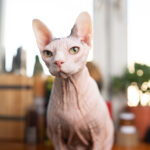Cats are naturally curious creatures, known for their inquisitive nature that often leads them to explore every nook and cranny of their surroundings. This inherent curiosity extends to the things their humans eat, and it’s not uncommon for cat owners to wonder if it’s safe to share certain human foods, like cinnamon, with their feline companions. Let’s explore the question “Can Cats Have Cinnamon” and uncover the facts about cinnamon and its effects on cats.
Is Cinnamon Safe for Cats?
While cinnamon isn’t classified as toxic to cats, it’s generally not recommended to intentionally include it in their diet. Here’s a detailed look at why cinnamon might not be the best choice for your feline friend:
-
Digestive System Sensitivity: Cinnamon contains essential oils, such as cinnamaldehyde, which can be irritating to a cat’s sensitive digestive system. Even small amounts of cinnamon ingestion can potentially lead to gastrointestinal upset, manifesting as symptoms like diarrhea and vomiting. These symptoms can cause discomfort and distress for your cat.
-
Potential for Allergic Reactions: Just like humans, cats can also suffer from allergies. Some cats may exhibit a heightened sensitivity to cinnamon compared to others, making them susceptible to allergic reactions. These reactions can vary in severity, ranging from mild skin irritation and itching to more pronounced symptoms.
-
No Nutritional Benefit for Cats: Cinnamon is sometimes discussed for its potential health benefits in humans, such as blood sugar regulation. However, these benefits are not relevant or necessary for cats. Cats have very different metabolic and nutritional needs compared to humans, and cinnamon offers no proven health advantages for them. Their dietary requirements are primarily focused on protein and specific nutrients derived from meat sources.
Potential Risks of Cinnamon for Cats
To ensure the safety and well-being of your beloved cat, it’s crucial to understand the potential risks associated with cinnamon consumption:
-
Gastrointestinal Distress: As previously mentioned, cinnamon can cause digestive issues in cats. The irritation from cinnamon can lead to vomiting and diarrhea, which, while sometimes mild, can become more serious, leading to dehydration and electrolyte imbalances, especially in kittens or senior cats.
-
Allergic Reactions: Allergic responses in cats can manifest in various ways. You might observe symptoms such as excessive scratching, skin rashes, or even respiratory distress like coughing, sneezing, or difficulty breathing. Severe allergic reactions are a medical emergency and require immediate veterinary intervention.
-
Respiratory Irritation from Cinnamon Powder: Cats are known to investigate scents, and the strong aroma of cinnamon powder might pique their interest. However, if a cat inhales cinnamon powder, the fine particles can irritate their respiratory tract. This inhalation can lead to coughing, sneezing, and difficulty breathing, particularly for cats with pre-existing respiratory conditions like asthma.
Why Cinnamon Offers No Benefits to Cats
It’s important to reiterate that while cinnamon may have some purported health benefits for humans, these do not translate to benefits for cats. Cats are obligate carnivores with specific nutritional needs that are met by a meat-based diet. Cinnamon does not offer any vitamins, minerals, or other nutrients that are essential or beneficial for feline health. Therefore, there is no reason to intentionally add cinnamon to a cat’s diet.
Safe Alternatives to Cinnamon Treats for Your Cat
If you’re looking for ways to treat your cat or provide them with a special snack, there are numerous safe and cat-appropriate alternatives to consider:
-
Catnip: Catnip is a herb that elicits a euphoric response in many cats. You can offer catnip as a treat, sprinkle it on scratching posts to encourage use, or incorporate it into toys for enriching playtime.
-
Commercially Available Cat Treats: The pet market is saturated with a wide variety of cat treats that are specifically formulated to be nutritionally balanced and safe for feline consumption. Look for treats that are approved by veterinarians or made with high-quality ingredients. Always offer treats in moderation as part of a balanced diet.
-
Fresh Cat Grass: Some cats enjoy nibbling on fresh cat grass (such as wheatgrass, oat grass, or barley grass). Cat grass is safe for cats to eat and can aid in digestion and help prevent hairballs. You can grow cat grass at home or purchase it from pet stores.
When to Seek Veterinary Care
If your cat has accidentally ingested cinnamon or if you observe any signs of discomfort or adverse reactions, it’s crucial to take prompt action:
-
Contact Your Veterinarian Immediately: If you suspect your cat has eaten cinnamon and is showing symptoms like vomiting, diarrhea, lethargy, difficulty breathing, or skin reactions, contact your veterinarian without delay. If you are a client of Arvada Veterinary Hospital, you can call them at (303) 424-4439 for immediate guidance and advice on how to proceed. Describe the symptoms you are observing and the circumstances of the potential cinnamon ingestion to help the veterinarian assess the situation accurately.
-
Closely Observe Your Cat: Even if symptoms appear mild initially, closely monitor your cat’s behavior and overall condition. Note any changes or worsening of symptoms. This information will be valuable when you communicate with your veterinarian.
While cinnamon is not inherently toxic to cats, it’s best practice to avoid offering it to them due to the potential risks of digestive upset and allergic reactions. Prioritize providing your feline companion with a balanced, species-appropriate diet and explore safe and healthy treat options to keep them happy and thriving. If you have any concerns regarding your cat’s diet or health, always consult with your veterinarian for professional advice and tailored care.

